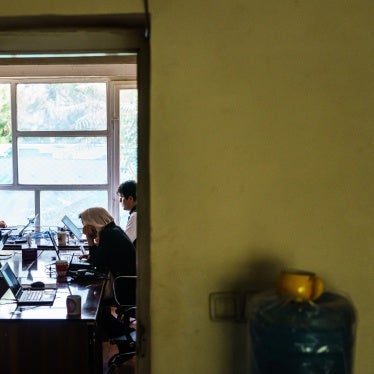Ni Yulan said the guards at her cell block had a unique way of punishing her during her 2008-2010 prison term: they’d take away the Chinese activist’s crutches. Unable to walk as a result of severe police beatings during a 2002 stint in detention, Ni said that the guard’s confiscation of her crutches was as humiliating as it was physically painful. “They’d make me crawl,” she said quietly.
It was the summer of 2010, and I sat with Ni in a Hong Kong hotel as she matter-of-factly recounted the pain and indignities that she had suffered over the past decade for merely trying to get the Chinese government to respect some of the rights enshrined in China’s laws and Constitution for people facing housing evictions. Ni was in Hong Kong for a short visit with supporters after the completion of her two-year prison term on charges of “obstructing a public official.” And her stories – visceral accounts of the costs that one individual and her family had borne for challenging their government’s often abusive status quo – were extremely moving.
But Ni was anything but cowed. Instead, she was resolute about the need for true rule of law in China to prevent others from suffering injustices like those inflicted on her. It was clear that she was going to keep fighting. And it was equally clear that the government officials who had already forcibly demolished her Beijing family home, permanently disabled her, and stripped her of her right to practice law were unlikely to change their abusive course.
On July 27, a Beijing appeals court cut two months off Ni’s 32 month prison sentence on spurious charges of fraud and “creating a disturbance“ handed down on April 10, dismissing the fraud charge. The court rejected allegations that Ni had “swindled” funds from supporters and ruled instead that any money she received from them were legitimate donations. That judgment is a small symbolic victory for Ni. But it still means she won’t leave prison until late 2014 on the “creating a disturbance” conviction for which her husband, Dong Jiqin, also received a two-year prison term.
The “disturbance” at issue? On April 7, 2011, Ni and her husband were swept up in a wave of unlawful disappearances of Chinese lawyers, civil society activists, artists, and bloggers. Those disappearances were part of the Chinese government’s harsh crackdown on perceived dissent prompted by official concern about a possible contagion effect of the “Arab Spring” protests. The couple was formally arrested on May 17, and in July, Ni was additionally charged with committing fraud.
Like other high profile victims of the Chinese government’s hostility to peaceful dissent, Ni has been motivated in her work by a powerful sense of injustice. Ni focused on the epidemic of forced evictions and demolitions across vast swathes of Beijing, which accelerated in the run-up to the 2008 Beijing Olympics.
In September 2002, that activism, and particularly her filming of a forced eviction, gave her a year in prison for “obstructing official business,” along with the revocation of her lawyer’s license. Undaunted, Ni continued to denounce illegal evictions and unfair compensation after her release. Just before the Beijing Olympics, Ni was sentenced to two years in prison after trying to stop the demolition of her own home. While in prison, she was tortured and denied adequate medical care.
After her 2010 release, and in the aftermath of her Hong Kong visit, Ni said her and her husband were harassed and intimidated by elements of the Beijing police who she believed wanted to punish her for her housing rights activism. Ironically, that harassment made it virtually impossible for the couple to find housing, and they were forced to shelter in a Beijing public park for several months. The couple finally moved to a small hotel room after their living circumstances were exposed in foreign media reports, but Ni said police harassment continued, and featured disruptions in the supply of electricity and water to their room. Despite those privations, Ni continued throughout to dispense free legal advice to petitioners, residents from the rural countryside who come to the capital seeking legal redress for abuses by local officials, until her April 2011 arrest.
As the ruling Chinese Communist Party undertakes its historic transition from the era of President Hu Jintao and Premier Wen Jiabao to presumed successors Xi Jinping and Li Keqiang, pundits will spill no shortage of ink trying to define the fruits of the Party’s 62-year monopoly on power and its future direction.
Ni Yulan, unbowed in her prison cell, could give them an earful.
Phelim Kine is deputy Asia director at Human Rights Watch.





